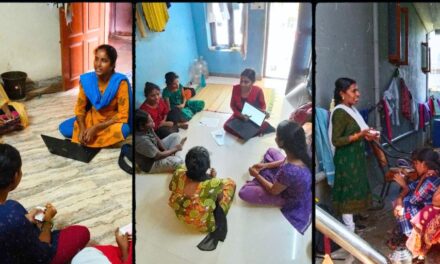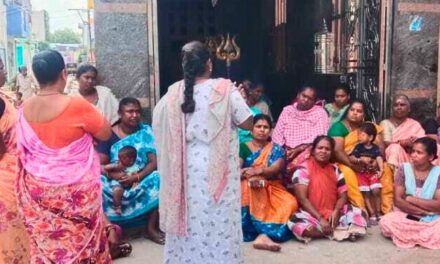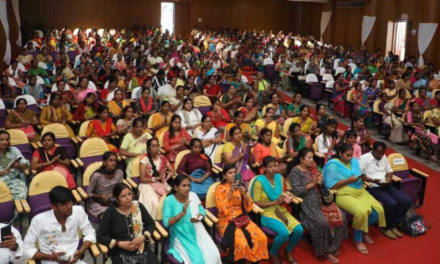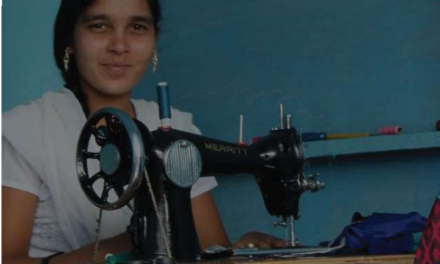Workers Speak Through Song, Skits, and Dialogue, Organised by Cividep India and Partners
Nagamma has spent 35 years on Bengaluru’s garment-factory floors. Her wages began at ₹250 a month in 1990 and today she earns ₹12,800. A widow with one son, she stood on stage at the Student Christian Movement House, representing countless women who have raised families around factory wages and shifts.
She was joined by others with equally striking stories: Bhagya, who separated from her husband when her baby was five months old; Vennilla, who never attended school, yet has supported her entire family; and Shanta, who has 37 years of factory experience and has adopted a child while balancing work and caregiving.
These voices came together in August 2025, when more than 600 women garment workers gathered at two Bengaluru forums organised by Cividep India and partner groups seeking dignity at work and strengthening workers’ collective voice.

Workers arrive at the venue
Breaking Silence Through Song
The first forum, Our Right, Our Voice: Forum for Women Workers Education, jointly organised by Cividep India and the Garment Labour Union (GLU), brought 120 women together on August 17. The event opened not with speeches but with ‘Janadhikaara’ (People’s Power), a song of resilience composed and performed by Deepada Malli. The song’s message hit home: even in darkness, a tiny lamp can bring light.
Saroja, general secretary of the Garment Labour Union (GLU), explained that the collective was founded 13 years ago to create a space where women could raise concerns often overlooked. The forum became a larger platform to discuss issues that shape their daily lives, she said.

Garment workers participate in the discussion


Hard-Won Gains on Wages and Hours
Participants spoke about wages and working hours, long-standing flash points in the industry. After years of advocacy, the Karnataka government approved a minimum wage revision in April 2025 to ₹19,319 for unskilled workers and up to ₹34,225 for highly skilled workers, following Supreme Court guidance. This came only after unions challenged attempts to freeze the Variable Dearness Allowance during the pandemic, said Satyanand M., state secretary, All India Trade Union Congress (AITUC).
Working hours remain a concern. The government’s pilot of 12-hour shifts in 2023 initially seemed attractive, but workers soon experienced serious health effects, he said. During the discussion, many workers spoke candidly about their own health challenges, creating a moment of collective analysis that underscored the power of coming together.
Lakshmi Venkatesh, president of the Indian National Trade Union Congress (INTUC), stressed the need for worker solidarity and highlighted opportunities for dialogue with the state labour minister and urged workers to share concerns through their unions.

(From left): Rukmini V P, President, Garment Labour Union; D. Lakshmi Venkatesh, President, Indian National Trade Union Congress; Nagalakshmi Chowdhary, Chairperson, Karnataka State Women’s Commission; Shamana Reddy, Working President, Indian National Trade Union Congress at the SCM House
Expanding the Conversation
Two weeks later, the Safe Workplaces, Equal Voices Mahasangama, organised by Cividep India with Samruddhi Trust, Sadhana Trust, Munnade Social Organisation, KSG and the Tailoring Workers’ Union (TWU), drew 490 women from workers from Peenya, Mysore Road, Sunkadakatte and Ramanagara. Music, dance, and theatre performances gave the event a distinctly artistic and cultural character.
A powerful skit, ‘Garment Karmikara Ondu Dinada Baduku’ (A Day in the Life of a Garment Worker), directed by theatre artist Narayanaswami and performed by children of workers together with staff from Munnade and Cividep, formed the heart of the event. Blending movement and sharp dialogue, it portrayed the daily realities of caring for sick in-laws, managing drunken husbands, confronting workplace harassment, and resisting domineering supervisors — stories in which the audience clearly recognised themselves.




Scenes from the skit ‘Garment Karmikara Ondu Dinada Baduku’ (A Day in the Life of a Garment Worker)’ by Cividep and Munnade staff, along with the children of workers
When Experts Speak about the Factory Floor
Writers and cultural figures deepened the discussion. Poet Dr. K. Sharifa highlighted the harsh realities women garment workers face: unsafe workplaces, inadequate facilities, and the double burden of factory work and family responsibilities, all without sufficient rest, respect, or recognition. She noted, for instance, that many women drink less water to avoid unhygienic toilets.
Complementing this, writer Sabiha Bhoomi Gowda, former vice-chancellor of Akkamahadevi Women’s University, analysed the industry’s deliberate structure. Production is fragmented so that “one worker never stitches an entire garment,” isolating workers and limiting bargaining power. She drew connections between these local struggles and global patterns, referencing American cotton mill movements and citing fellow writer Sabiha Bannadi, whose poem portrays workers stitching beautiful clothes while enduring pain, exploitation, and systemic invisibility.
Dr. M.S. Ashadevi, feminist critic, writer, and professor, began her speech by narrating an incident about K.V. Subbanna. Looking out of the window, he witnessed hundreds of women pouring out of a factory gate, like an endless stream, almost resembling half-burnt bodies emerging from a crematorium. Quoting the celebrated Dalit poet Siddalingaiah’s poem ‘Nanna Jana Olle Jana,’ she described garment workers as resilient people. She then invoked Ammuge Rayamma’s vachana: ‘Enna Kannola Kattigeya Naane Thegiyabeku…’ (I must clear the dust from my own eyes).

Support and Responsibility
Nagalakshmi Chowdhary, Chairperson of the Karnataka State Women’s Commission, contributed a perspective at both events. She spoke about how gender discrimination often begins at home and emphasised that “women must first secure their entitlements and work toward financial independence.” Drawing from her factory visits in Peenya, she highlighted the widespread challenges women face: low wages, workplace harassment, heavy domestic burdens, and health concerns. She explained how she had requested factory management to provide orthopaedic shoes for women who stand for long hours.
At the Mahasangama, Chowdhary outlined government support schemes available to workers, including ₹4,000 monthly assistance for single mothers, and encouraged them to make full use of legal protections such as PoSH committees (Internal Complaints Committees under the Sexual Harassment of Women at Workplace [Prevention, Prohibition and Redressal] Act, 2013). She also provided guidance for addressing domestic violence, highlighting the police helpline 112 as a resource.
A Growing Movement
Workers and organisers alike emphasised that individual struggles bring limited change, but collective action can shift the industry. Yashodhamma P. H., general secretary of Munnade Social Organisation noted that such forums are timely, as US tariffs threaten to destabilise the garment sector, echoing challenges faced during COVID-19.
Rukmini, president of the Garment Labour Union, highlighted the opportunity this moment presents for workers to come together and assert their rights. Deepika Rao, executive director of Cividep India, as quoted in The Hindu, said the effort builds on Cividep’s report The Home and the World of Work and its documentary Garment Kelsa: “It’s about educating workers on their rights and helping them come together as collectives.”
As Dr. Ashadevi concluded, “Like the phoenix that survives, each trial makes us stronger. Women, too, can rise from every challenge.”
(With inputs from Jamuna Gowda)

Nagalakshmi Chowdhary, Chairperson, Karnataka State Women’s Commission, addresses the workers; also seen, Yashodhamma P H, General Secretary, Munnade Social Organisation

Workers who had travelled from across the city listen to the speaker





